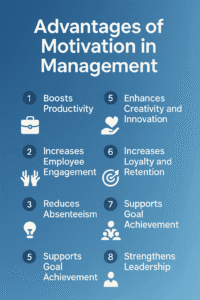The Advantages of Motivation in Management
Discover how fostering a motivated workforce transcends feel-good culture and becomes the single most powerful engine for business growth, innovation, and resilience.
In the complex machinery of a successful business, motivation is the fuel. While skilled employees, robust strategies, and cutting-edge technology are all critical components, they cannot reach their full potential in an environment devoid of motivation. Effective management isn’t just about directing tasks; it’s about inspiring action, fostering commitment, and creating an atmosphere where every individual is driven to contribute their best work.
A motivated workforce is not a luxury—it is a profound competitive advantage. It translates directly into tangible business outcomes, transforming a group of employees into a cohesive, high-performing team. Let’s explore the key advantages that highlight why placing motivation at the heart of your management philosophy is the most strategic investment you can make.
Key Benefits of a Motivated Workforce
Increased Productivity and Performance
This is the most direct benefit. Motivated employees work with greater purpose and energy. They are not just completing tasks; they are committed to achieving goals. They apply more effort, maintain higher standards of quality, and actively look for more efficient ways to work, leading to a significant boost in overall output and performance.
Lower Employee Turnover (Higher Retention)
Employees who feel valued, challenged, and recognized are far less likely to seek opportunities elsewhere. High motivation is intrinsically linked to job satisfaction. Lowering turnover saves the company substantial costs associated with recruitment, hiring, and training new staff, while also preserving valuable institutional knowledge.
Enhanced Innovation and Creativity
Motivation unlocks creativity. When employees are genuinely engaged, they feel psychologically safe to propose new ideas, experiment with novel solutions, and challenge the status quo. A motivated environment encourages a problem-solving mindset, turning the entire workforce into a source of innovation that can drive the company forward.
Improved Teamwork and Collaboration
Motivation is contagious. A positive, driven atmosphere fosters better interpersonal relationships and a stronger sense of team unity. Motivated individuals are more willing to support their colleagues, share knowledge, and work collaboratively towards common objectives, breaking down departmental silos and creating a more cohesive organization.
Greater Adaptability to Change
The modern business landscape is in constant flux. Motivated employees have a more positive and proactive outlook towards change. They see new challenges as opportunities for growth rather than threats. This adaptability is crucial for any organization looking to navigate market shifts, technological advancements, and evolving customer demands successfully.
Better Customer Service and Satisfaction
Happy, motivated employees lead to happy customers. An employee who is proud of their work and feels connected to the company’s mission will go the extra mile to ensure a positive customer experience. This enthusiasm translates into better service, stronger client relationships, and enhanced brand loyalty.
Increased Employee Initiative
Motivated employees don’t wait to be told what to do. They demonstrate a sense of ownership and take the initiative to identify problems, seize opportunities, and contribute beyond their basic job descriptions. This proactive behavior is a hallmark of a highly efficient and effective workforce.
Positive Company Reputation
A company known for its motivated, engaged workforce becomes an “employer of choice.” This positive reputation not only helps in attracting and retaining top talent but also enhances the company’s image in the eyes of customers, partners, and investors, creating a virtuous cycle of success.
Motivation: The Heartbeat of Management
Ultimately, the advantages of motivation ripple through every facet of an organization. Effective managers understand that their primary role is to create the conditions under which their team’s intrinsic motivation can flourish. By focusing on recognition, empowerment, purpose, and growth, they build a resilient, productive, and forward-thinking organization.
